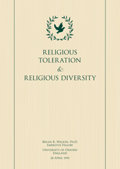Perhaps because those in authority as well as the public at large in western Christendom have so often narrowly defined religion according to the familiar model of the received tradition of orthodox Christianity, new religions have, over the long course of history, been subject to often fierce opposition. Of course, the case goes back beyond the establishment of Christianity itself. In the Roman world, the early Christians were themselves subject to accusations that are still familiar—Christians were alleged to break up families; were accused of mercenary motives; were said to engage in sexual orgies; and were declared to be trying to infiltrate social elites in pursuit of sinister political purposes. The exclusivistic character of Christianity attracted such allegations, but that same trait, together with its proselytizing zeal, made Christianity itself an unparalleled agency of religious intolerance, which persisted, in some countries and in greater or lesser measure, down to modern times. Thus the Quakers experienced savage persecution at the hands of the authorities in seventeenth-century England, when many of them were imprisoned solely because of their avowal of their religious beliefs. Methodists, as a new religion in eighteenth-century England, were mobbed and beaten and some of their chapels were pulled down, sometimes with the connivance or even at the instigation of local magistrates. In the late nineteenth-century, the Salvation Army was the subject of riots in which some of their members were killed in England, whilst in Switzerland they were publicly accused of deception and financial exploitation, and the Mormons, sometimes imprisoned when seeking to recruit new members in Scandinavia, suffered similar accusations. History makes evident the record of opposition to new forms of religious and spiritual expression even in the more democratic and supposedly more tolerant countries of the western world. Against that historical record, the recent resolutions of international agencies requiring states to exercise and encourage religious toleration stand in sharp contrast.
XXV. The Opposition to New Religions

Scientology, Social Science and the Definition of Religion
by James A. Beckford, Professor of Sociology, University of Warwick, England

Social Change and New Religious Movements
by Bryan R. Wilson,
Emeritus Fellow in Sociology, Oxford University

The Church of Scientology
by Juha Pentikäinen, Marja Pentikäinen, University of Helsinki, Finland

The Relationship Between Scientology and Other Religions
by Fumio Sawada, Eighth holder of the secrets of Yu-itsu Shinto, the oldest religion in Japan; President, Ahlul-Bait Center

The Religious Nature of Scientology
by Geoffrey Parrinder, Methodist minister, Professor, Comparative Study of Religions, University of London

Religious Philosophy, Religion and Church
by G.C. Oosthuizen, Professor of Science of Religion, University of Durban-Westville, Natal, South Africa

Scientology a New Religion
by M. Darrol Bryant, Department of Religious Studies, Renison College, University of Waterloo, Ontario, Canada

Apostates and New Religious Movements
by Bryan R. Wilson,
Emeritus Fellow in Sociology, Oxford University

Scientology: An Analysis and Comparison of its Religious Systems and Doctrines
by Bryan R. Wilson,
Emeritus Fellow in Sociology, Oxford University

The Reliability of Apostate Testimony About New Religious Movements
by Lonnie D. Kliever Ph.D., Professor of Religious Studies

The Sea Organization and its Role Within the Church of Scientology
by Frank K. Flinn Ph.D. Adjunct Professor in Religious Studies

Brief Analyses of the Religious Nature of Scientology
by J. Gordon Melton, Baylor University, Samuel Hill, Gary Bouma, Irving Hexham

Congregational Services of the Church of Scientology
by Bryan R. Wilson,
Emeritus Fellow in Sociology, Oxford University

Is Scientology A Religion?
by Alan W. Black, Associate Professor of Sociology, University of New England, Armidale, New South Wales, Australia

Is Scientology a Religion?
by Dean M. Kelley, National Council of Churches

Religious Toleration & Religious Diversity
by Bryan R. Wilson,
Emeritus Fellow in Sociology, Oxford University

Scientology A Religion In South Africa
by David Chidester, Professor of Comparative Religion, University of Cape Town, South Africa

Scientology: A True Religion
by Urbano Alonso Galan, Professor of Philosophy and Theology, Gregorian University of Rome

Scientology: A Way of Spiritual Self-Identification
by Michael Sivertsev, Moscow Academy of Sciences

Scientology: A Worshipping Community
by Lonnie D. Kliever, Southern Methodist University, Dallas, Texas

Scientology and Contemporary Definitions of Religion in the Social Sciences
by Alejandro Frigerio, Professor of Sociology, Catholic University of Argentina, Buenos Aires

Scientology and Islam an Analogous Study
by Fumio Sawada, Eighth holder of the secrets of Yu-itsu Shinto, the oldest religion in Japan; President, Ahlul-Bait Center

Scientology and Religion
by Christiaan Vonck, Rector, Faculty for Comparative Study of Religion, Antwerp, Belgium

Scientology: A Comparison with Religions of the East and West
by Per-Arne Berglie, Professor of History of Religion, University of Stockholm

Scientology Its Cosmology, Anthropology, System of Ethics and Methodologies
by Régis Dericquebourg, Professor of Sociology of Religion, University of Lille III, France

Scientology – Its Historical-Morphological Frame
by Dario Sabbatucci, Professor of History of Religions, University of Rome

Scientology: Its True Nature
by Harri Heino, Professor of Theology, University of Tampere, Finland

Scientology: The Marks of Religion
by Frank K. Flinn, Adjunct Professor of Religious Studies Washington University

